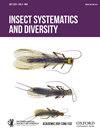Integrating UCE Phylogenomics With Traditional Taxonomy Reveals a Trove of New World Syscia Species (Formicidae: Dorylinae)
IF 3.1
1区 农林科学
Q1 ENTOMOLOGY
引用次数: 6
Abstract
Abstract The ant genus Syscia Roger, 1861 is part of the cryptic ant fauna inhabiting leaf litter and rotten wood in the Asian and American tropics. It is a distinct clade within the Dorylinae, the subfamily from which army ants arose. Prior to this work, the genus comprised seven species, each known from a single or very few collections. Extensive collecting in Middle America revealed an unexpected and challenging diversity of morphological forms. Locally distinct forms could be identified at many sites, but assignment of specimens to species spanning multiple sites was problematic. To improve species delimitation, Ultra-Conserved Element (UCE) phylogenomic data were sequenced for all forms, both within and among sites, and a phylogeny was inferred. Informed by phylogeny, species delimitation was based on monophyly, absence of within-clade sympatry, and a subjective degree of morphological uniformity. UCE phylogenomic results for 130 specimens were complemented by analysis of mitochondrial COI (DNA barcode) data for an expanded taxon set. The resulting taxonomy augments the number of known species in the New World from 3 to 57. We describe and name 31 new species, and 23 species are assigned morphospecies codes pending improved specimen coverage. Queens may be fully alate or brachypterous, and there is a wide variety of intercaste female forms. Identification based on morphology alone is very difficult due to continuous character variation and high similarity of phylogenetically distant species. An identification aid is provided in the form of a set of distribution maps and standard views, with species ordered by size.将UCE系统基因组学与传统分类学相结合揭示了一批新的世界系统物种(蚁科:Dorylinae)
摘要Syscia Roger蚂蚁属,1861年,是栖息在亚洲和美洲热带落叶和腐烂木材中的神秘蚂蚁动物群的一部分。它是Dorylinae中一个独特的分支,Doryliae是军蚁的起源亚科。在这项工作之前,该属由七个物种组成,每个物种都是从单个或极少数的集合中已知的。在中美洲的广泛采集揭示了一种意想不到的、具有挑战性的形态多样性。在许多地点可以识别出局部不同的形态,但将标本分配到跨越多个地点的物种是有问题的。为了改进物种划界,对超保守元素(UCE)的系统发育数据进行了测序,包括位点内和位点间的所有形式,并推断了系统发育。根据系统发育学,物种划界是基于单系性、分支内同域的缺失和形态学一致性的主观程度。130个标本的UCE系统发育学结果通过对扩展分类单元集的线粒体COI(DNA条形码)数据的分析得到补充。由此产生的分类学将新大陆已知物种的数量从3个增加到57个。我们描述并命名了31个新物种,23个物种被指定为形态物种代码,等待标本覆盖率的提高。皇后可能是全翅型或短翅型,并且有各种各样的雌性形式。由于亲缘关系较远的物种具有连续的特征变异和高度相似性,单凭形态学鉴定是非常困难的。以一组分布图和标准视图的形式提供了识别辅助工具,并按大小排列了物种。
本文章由计算机程序翻译,如有差异,请以英文原文为准。
求助全文
约1分钟内获得全文
求助全文

 求助内容:
求助内容: 应助结果提醒方式:
应助结果提醒方式:


